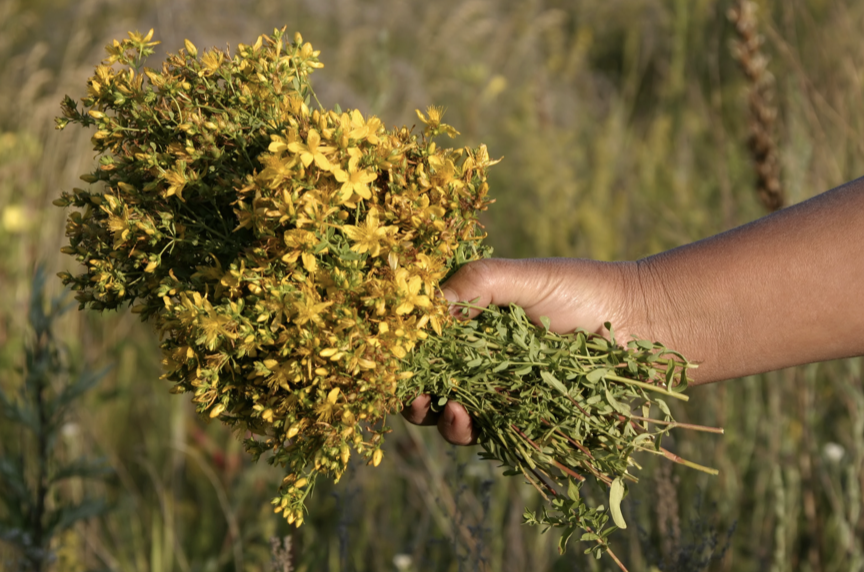It’s that time of year again- SUMMER! And what better way to celebrate this time of light than with our joyful friend, St. John’s wort!
This little yellow flowered plant is listed as a noxious weed in many states and other countries. You can find St. John’s wort (Hypericum perforatum) appearing in soils that are disturbed-like clear cuts, roadsides, and agri-business intensive fields.
The Greek name for this plant is Hypericum (also its Latin botanical name), which means “over a spirit.” It was believed to provide special protection, particularly during the summer months, when there is a tendency to feel overly expanded and adversely affected by heat and light.
Read More: DIY Organic Deodorant- That Actually Works!
St. John’s wort has been used for various ailments since the ancient Greeks; the Greek physician Hippocrates (ca.400 B.C.E.) was one of the first to document its therapeutic use.
Internally, St. John’s wort is world renowned for its ability to treat depression in adults and children. Ingestion is usually via tincture or dried plant capsules or tablets.
Externally, its anti-microbial and anti-viral properties heal wounds- including those from burns. Its analgesic and anti-inflammatory properties facilitate healing in the nervous system and many herbalists use it for its ability to relieve sciatica. Some have also found that it assists in reducing the appearance of scars by smoothing them out and reducing redness.
Energetically (Flower Essence), it lifts the spirit by “unfreezing” the emotional world so that a wider range of emotions can be experienced. It is extremely helpful for HSP’s (highly sensitive people) who carry a great deal of light within themselves but have a hard time maintaining balance in the earthly realm. They usually possess allergies or are unusually subject to environmental stress or trauma, or immune-related illnesses.
PRIMARY USES
INTERNAL
• Depression, mild to moderate
EXTERNAL
• Healing wounds (acute and contused injuries) • First-degree burns
• Myalgia (muscle pain)
OTHER POTENTIAL USES:
• Seasonal Affective Disorder
• Obsessive-Compulsive Disorder • Menopause
• Fatigue
• Pediatric nocturnal incontinence
• PMS
PHARMACOLOGICAL ACTIONS
Antidepressant, relaxant, improves mental performance, does not change alertness or have sedative effect; may have relaxing effect and improve concentration, memory, and receptivity.
DOSAGE AND ADMINISTRATION
For depression, the onset of response is similar to that for conventional antidepressants, requiring 2–4 weeks, or as long as 6 weeks. To prevent relapse, antidepressant should be continued at full therapeutic doses for at least 6 months after remission.
CONTRAINDICATIONS:
This plant medicine should not be taken in combination with any pharmaceutical antidepressants, without professional guidance. St. John’s wort is believed to interact with oral contraceptives and anticoagulants (e.g., warfarin).
For more information on St. John’s wort, please visit Herbal Gram

1 thought on “PLANT PROFILE: St. John’s Wort”
Pingback: DIY: Summer Solstice St. John's Wort Oil - Mary Wutz